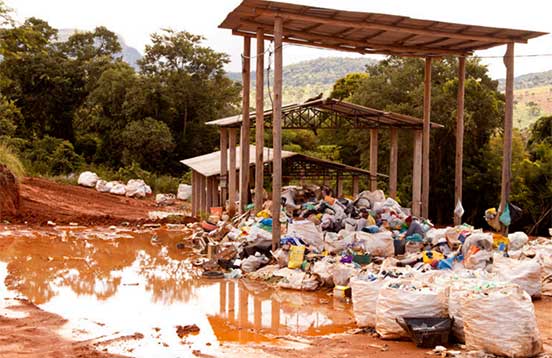Brazilian study shows why waste pickers are essential to climate adaptation planning.
More than 90% of waste pickers surveyed across Brazil have experienced climate change-related extreme weather events in the last year, with many reporting negative impacts on their health, earnings and ability to work, a new study shows.
The research, titled Climate-Change Impacts and Adaptation Strategies: Waste Pickers’ Experiences from Brazil, asked waste pickers how severe weather events had impacted them, and the strategies they used to cope and adapt.
It found 91% of waste pickers surveyed experienced at least one climate-change-related event in the past year, with 85% experiencing abnormal heat or heat waves, and 39% exposed to flash flooding. Close to 100 workers based in Manaus, Amazonas; Salvador, Bahia; and Belo Horizonte, Minas Gerais were interviewed for the study.
Sonia Dias, the lead researcher, says with climate change accelerating faster than predicted, and waste pickers’ health and earnings disproportionately impacted by extreme weather conditions, understanding the impact of climate change on this workforce - and other workers in informal employment - is vital.
“Cities are major carbon emitters, and they’re particularly badly hit by climate hazards. Things like heat waves, flooding and drought impact essential services like water supply, sanitation, transportation and energy provision,” she says.
“The waste pickers we interviewed are at the front line, facing dehydration, heat stroke, fatigue, and exposure to dangerous pathogens - so their perspectives are absolutely essential to creating effective climate-change adaptation plans.”
Dias says autonomous waste pickers (who work on their own) report more severe impacts than waste pickers who are part of cooperatives and associations.
“The research shows a range of coping and adaptation strategies. Individual waste pickers tended to try to keep working through the climate-change event, with limited impact on the city’s poor services and deteriorating infrastructure. Collective responses were more preventive, with workers coordinating processes for how to store waste and materials,” said Dias.
Dias says building waste pickers’ resilience to climate change builds resilience for the whole city, so municipalities should place waste pickers at the centre of future policies.
“Local governments need to invest in climate-sensitive workplace infrastructure to address heat waves and floods as a matter of urgency,” she says.
“Things like extreme weather monitoring, early warning systems and training for emergency response procedures are essential for informal workers to adapt to working through climate-related events.”
Dias says local governments already have a strong legal imperative to support waste pickers - the National Solid Waste Management Policy which guarantees their role in waste management systems. Going forward, city officials can translate this recognition into developing climate change adaptation policies and plans that centre waste pickers’ perspectives and needs.
Waste pickers - who collect, sort, recycle and sell recyclable materials - play a crucial role in reducing pollution and carbon emissions. They are responsible for gathering close to 60% of all plastic material that is recycled worldwide. In Brazil, over a quarter of a million people collect and sell recyclables for a living — a number that has generally increased in the last decade or so.
For further information or interviews, please contact
Nicole Pryor on nicole.pryor@wiego.org, Graciela Mora on graciela.mora@wiego.org or Kendra Hughes on kendra.hughes@wiego.org (EST).
Editor’s notes
About WIEGO
Women in Informal Employment: Globalizing and Organizing (WIEGO) is a global network focused on empowering the working poor, especially women, in the informal economy to secure their livelihoods. We believe all workers should have equal economic opportunities, rights, protection and voice. WIEGO promotes change by improving statistics and expanding knowledge on the informal economy, building networks and capacity among informal worker organizations and, jointly with the networks and organizations, influencing local, national and international policies. Visit www.wiego.org.
Worker quotes
Jeanne Santos, MNCR, Salvador city
"The heat wave is unbearable at times. Being inside a shed, where the roof is already zinc [...] Sometimes the shed doesn't have adequate ventilation, either, to mitigate this, and then we lose production [...] It affects our income because our livelihoods depends on our production. Half an hour that we stop producing, it affects our income and then when that wave of very strong heat hits, there's no way, right? Human beings have their limits." Jeanne in an interview in March 2023
Waste Picker (non-organized) - Carlos Antônio dos Reis (Carlão) Pimp my Carroça, São Paulo
"One recent change that's happening a lot is this wave of rain that's so heavy it's unusual here in São Paulo [...] the waste picker leaves in the morning, he works for a week. Come the weekend, when he's going to sell, the rain comes, everything's flooded, he's lost everything. [...] because we're self-employed, we're more focused on our work, we're very disconnected from what's happening on a daily basis. [...] Many waste pickers don't know how important it is. What causes it, how to deal with it? Not just for society, but how it will impact our work on a daily basis." Carlão in an interview in March 2023
Catadora Neli Medeiros - MNCR, Belo Horizonte and Municipal Waste & Citizenship Forum (FMLC BH)/ Fórum Municipal Lixo e Cidadania de Belo Horizonte
“We know that climate impacts are getting worse every day and on the earth everything is connected. And because of the work that we do, we are doctors of the environment, but we need to to make it healthier and for that we need to work together.”
See also: Climate-Change Impacts and Adaptation Strategies: Waste Pickers’ Experiences from Brazil
